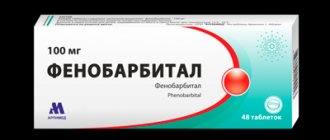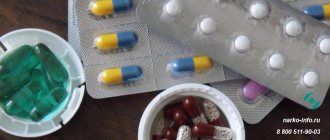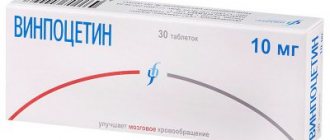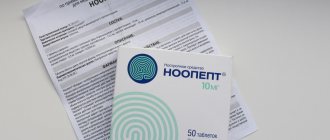Pharmacological action of Valium
The active substance of Valium, diazepam, has a pronounced sedative, muscle relaxant, hypnotic and anticonvulsant effect. During therapy, blood vessels dilate, resulting in a decrease in blood pressure. The drug is effective for the treatment of convulsive paroxysms associated with epilepsy, obsessive and phobic disorders, and sleep disorders.
The medication is used orally, intravenously and intramuscularly, with a sedative effect developing most quickly after intravenous administration (within a few minutes). According to the instructions, Valium has a stable therapeutic effect after 2-7 days of use. When using the medication against the background of withdrawal syndrome that develops with chronic alcoholism, the medication helps get rid of hallucinations and reduce the severity of other symptoms - tremor, agitation and delirium.
Pharmacology of medicine
Valium is a medication that exhibits anxiolytic, muscle relaxant, sedative, hypnotic and anticonvulsant properties.
Before telling you about the mechanism of action of the drug in question, you should understand what it is.
The drug "Valium" has the following patented name - "Diazepam". This is a drug belonging to the group of benzodiazepines and is of great importance in medicine.
Valium is a medication that, thanks to its anxiolytic activity, relieves internal worries, fears, anxiety and tension. Experts say that Diazepam has a dose-dependent effect on the central nervous system. In other words, in small quantities (about 2-15 mg per day) this drug causes a stimulating effect, and in large quantities (more than 15 mg per day) it causes a sedative effect.
Indications for use of Valium
Valium solution, dragees and tablets are prescribed according to the instructions for the treatment of:
- Anxiety disorders (usually as part of a combination treatment);
- Dysphoria;
- Insomnia;
- Skeletal muscle spasm;
- Tension headaches;
- Spastic conditions that are associated with damage to the spinal cord or brain, for example, tetanus, athetosis, cerebral palsy;
- Rheumatic pelvispondyloarthritis, myositis, arthritis, bursitis, progressive chronic polyarthritis;
- Arthrosis, accompanied by tension in the skeletal muscles;
- Vertebral syndrome;
- Angina pectoris;
- Alcohol withdrawal syndrome, including tension, anxiety, agitation, tremor and transient reactive states.
As part of complex therapy, Valium tablets are usually used to treat:
- Arterial hypertension;
- Meniere's disease;
- Peptic ulcer of the stomach and duodenum;
- Status epilepticus;
- Psychosomatic disorders in gynecology and obstetrics, including gestosis and menopausal and menstrual disorders;
- Eczema and other diseases that are accompanied by irritability and itching;
- Drug poisoning.
The medication is also used for premedication before operations and endoscopic procedures, general anesthesia.
Injections with Valium solution are used:
- When conducting medicinal preparation for general anesthesia;
- As a component of combined general anesthesia;
- As part of combination therapy in the treatment of myocardial infarction;
- In psychiatry and neurology in the treatment of motor agitation of various etiologies;
- In paranoid-hallucinatory states;
- To relieve epileptic seizures;
- To facilitate labor;
- During premature birth at the end of the third trimester of pregnancy, as well as premature placental abruption.
The drug "Valium": instructions for use
Only an experienced specialist should prescribe the remedy in question. For an adult patient, the oral dose of the drug should be 5-20 mg per day. This amount of medication is determined depending on the severity of the symptoms of the disease, as well as the overall clinical picture.
The maximum possible single dose of the drug is no more than 10 mg. The course of therapy with this remedy in case of anxiety should last about 6 weeks. After this period, you should contact your doctor so that he can select the minimum maintenance dosage.
The withdrawal of the drug in question is carried out gradually.
In emergency cases, this medication should be administered parenterally (intramuscularly or intravenously). In this case, a dose of 2-20 mg is used.
When administered intravenously, the drug should be administered very slowly, at a rate not exceeding 0.5–1 ml per minute.
Contraindications
Contraindications to the use of Valium are:
- State of shock;
- Coma;
- Acute alcohol and drug poisoning;
- Hypersensitivity to active (diazepam) or excipients;
- Myasthenia;
- Acute respiratory failure;
- Severe chronic obstructive pulmonary disease.
Also, the medication is not prescribed to pregnant and lactating women. In pediatrics, the prescription of Valium according to the instructions is possible for children starting from six months.
Cost of the drug
As mentioned above, you can’t buy Valium Roche in Russia in every pharmacy. The cost of this medicine is approximately a thousand rubles (per package).
The price of this product in the UK and other European countries is usually about two hundred and fifty pounds sterling per thousand tablets (10 milligrams).
To purchase a drug in your city that will meet all safety and quality requirements, experts recommend contacting the help desk, where you will be provided with complete information about its availability in pharmacies and the best prices.
How to use Valium
The treatment regimen for Valium tablets depends on the disease and the patient’s response to the therapy. As a rule, the medication is used in the treatment of:
- Hypochondriacal and hysterical reactions, neurological degenerative diseases, neuroses, dysphoria and phobias - up to 3 times a day, 5-10 mg;
- Alcohol withdrawal syndrome - during the first day, 10 mg 3-4 times a day. In subsequent days, the dose should be halved without reducing the frequency of use;
- Menopausal, menstrual, psychosomatic disorders and gestosis - three times a day, 2-5 mg;
- Angina pectoris and high blood pressure – 2-5 mg three times a day;
- Vertebral syndrome - 10 mg four times a day with bed rest;
- Arthrosis, chronic polyarthritis – 5 mg. The frequency of use can vary from 1 to 4 times a day.
At the beginning of therapy for atherosclerosis, elderly people, as well as patients weakened by the disease, are prescribed Valium in a dosage not exceeding 2 mg twice a day.
For children 1-3 years old, Valium tablets are prescribed 1 mg, for children 3-7 years old - 2 mg, for older children - 3-5 mg. In some cases, for example, with severe epileptic seizures, motor agitation, spinal cord injuries, it may be necessary to administer the drug intravenously or intramuscularly.
The medication is administered intramuscularly for heart attack and preeclampsia at the beginning of treatment in an amount of 10 mg, after which Valium tablets are taken 5-10 mg one to three times a day.
To facilitate labor, after opening the cervix by 2-3 cm, 20 mg of the drug is administered intramuscularly. In case of premature birth, if placental abruption occurs prematurely, 20 mg of Valium is also administered. If necessary, the same dose is administered again after an hour. In addition, injections of Valium solution are used for anesthesia, in the treatment of spastic conditions of rheumatic origin and vertebral syndrome.
Form, packaging and composition
Valium is a drug that can be purchased in the form of an injection solution and also in tablet form. What is included in these products?
1 ml of injection solution contains 5 mg of diazepam. This medication goes on sale in 50 or 10 2 ml dark glass ampoules, placed in cardboard packs.
As for the tablets, they may contain 10 or 5 mg of diazepam, as well as the following additional ingredients: corn starch, anhydrous lactose, calcium stearate, gelatinized starch, dyes.
The drug "Valium" in tablet form is packaged in cardboard packs that contain cell blisters.
Side effects
At the beginning of therapy with Valium, according to reviews, the following may be observed:
- Drowsiness;
- Dizziness;
- Disorientation;
- Increased fatigue;
- Lethargy;
- Poor coordination of movements;
- Slowing of motor and mental reactions;
- Retrograde amnesia;
- Decreased attention.
In some cases, euphoria, muscle spasms, tremors, headache, depression, confusion, depression, dysarthria, weakness, hallucinations, catalepsy, agitation, fear, anxiety, irritability, insomnia and other mental and nervous system disorders may occur.
In addition, according to reviews, taking Valium can lead to the development of disorders from:
- Digestive system: in the form of heartburn; constipation; hiccups; nausea; vomiting; dry mouth;
- Cardiovascular system: in the form of tachycardia; reducing blood pressure; thrombosis
In especially severe cases, Valium, according to reviews, causes breathing and vision problems. Also, the medication can lead to addiction, and its abrupt withdrawal can lead to a worsening of the condition. Therefore, it is not recommended to purchase and take Valium without a prescription, and the treatment course must be fully agreed with the attending physician.
Overdose and side effects
Exceeding the daily dosage manifests itself in the form of central nervous system depression of varying severity - from drowsiness and confusion, to hypotension, respiratory complications and the onset of coma.
Symptoms of overdose can be relieved by inducing vomiting in the patient and taking the required amount of activated charcoal. If the patient is unconscious, he should undergo gastric lavage and administer the antidote of benzodiazepine substances - Flumanesil.
Side effects from taking the drug include:
- addiction;
- decreased concentration and worsening reaction;
- impairment of short-term memory;
- dizziness;
- headache;
- a disorder of the musculoskeletal system, manifested in the form of dysarthria and ataxia;
- decreased blood pressure;
- allergic reactions.
Long-term uncontrolled use of the drug can lead to disruption of the kidneys and liver, as well as reduce libido and lead to impotence.
Consumer reviews about the medicine
Valium is a fairly popular drug among patients, which is used as an anxiolytic, muscle relaxant, sedative, hypnotic and anticonvulsant. According to reviews from most consumers, the medication in question turns out to be highly effective for various diseases, including epilepsy, sleep disorders, anxiety conditions, and so on. Also, taking it helps to reduce manifestations in the form of agitation, tremor and eliminate hallucinations.
However, there is no such remedy that would suit everyone. Some people who have used this drug have been unhappy. They note that the medicine begins to act only after a week. In addition, with prolonged use, the medication causes a large number of adverse reactions and leads to addiction.
What are neuroleptics?
Neuroleptics are antipsychotic substances that are used only in psychiatry. They are used to interrupt psychoproductive symptoms and eliminate delusional ideas. This is a large group of drugs for the treatment of various mental disorders. The second name for neuroleptics is antipsychotics.
There is a certain classification of these drugs. Thus, a distinction is made between typical and atypical antipsychotics. Typical – classical antipsychotic drugs. Given their high therapeutic doses, there is a high probability of side effects. Atypical are modern drugs, they can reduce the development and severity of side effects.
There are long-acting antipsychotics. They can have a long-lasting effect of up to a month, an average of 21 days. Other names for these drugs are decanoate or depot. They are very convenient as there is no need to take them every day. This is important because quite often patients forget to do this, but here they come to see a doctor and have the opportunity, after a consultation at which they are prescribed a long-acting antipsychotic, to immediately buy and take the medicine.
Only a psychiatrist or a psychiatrist-narcologist can prescribe antipsychotics; a psychologist does not prescribe them at all. It is extremely rare that these medications can be prescribed by a neurologist according to indications, but only after consultation with a psychiatrist.
Free consultation right now!
Online consultation with a specialist on your issue!
License number: LO-77-01-019036
In what cases are they prescribed to patients?
What antipsychotics combat: they relieve symptoms of fear, anxiety, agitation, that is, strong emotional arousal, tension in the body, and improve the quality of sleep. This allows them to be used quite effectively for anxiety, depressive and phobic disorders. In addition, they struggle with symptoms such as delusions, hallucinations, various mood swings, aggressive and dangerous behavior in which the patient can be dangerous to himself and others, psychomotor agitation, which is quite often observed in reactive states. Also, some psychiatrists prescribe antipsychotics to treat apathy and lethargy in depression.
What is neuroleptic syndrome?
Neuroleptic syndrome is a side effect of neuroleptics. It may occur when the drug is administered in large doses or when a given antipsychotic is not suitable for the patient. Its consequence is an extrapyramidal disorder, that is, increased muscle tone, movements become constrained, slowed down, slurred speech is possible, and restlessness in place.
Other adverse reactions include confusion, changes in psychoproduction. A person can completely change, he will not understand where he is, he will feel bad. There will be weakness, slurred speech or impaired articulation, drowsiness, and lethargy. Thought processes are disrupted, and this is memory, attention (concentration decreases), thinking itself also suffers greatly.
Antipsychotics can also cause other extrapyramidal reactions. For example, when various muscles begin to cramp: arms, neck, tongue, difficulty breathing, swallowing, etc. occurs.
With a malignant reaction to the drug, the temperature rises and all of the above phenomena increase. A serious and difficult to treat condition. Without help, this can even lead to death.
Endocrine disorders may also occur as side effects. It happens that obesity, weight gain, changes in appetite, and body weight are observed. Amenorrhea may occur in female patients. Also, side effects often include diarrhea, constipation, and difficulty urinating. Extremely rare side effects include autonomic disorders (for example, mild tremor, chills, sweating).
To prevent the onset of neuroleptic syndrome, proper selection of a neuroleptic is important. Corrective drugs should be immediately prescribed to it, which remove the symptoms of extrapyramidal disorders.
How often are side effects observed after taking antipsychotics?
In hospital settings they are practically not observed. Because the drugs are prescribed together with correctors.
Are antipsychotic drugs available over the counter? Can you buy them without a prescription?
No, they are not available and should not be available for sale. It was extremely rare in the past to be able to purchase them with a prescription written out more than a few months ago. Now, according to new guidelines and instructions, the drug is prescribed only for a short period of time, that is, 60 days, no more. Then the patient comes to the psychiatrist, and he writes out a repeat prescription.
And what could be the consequences of using it without a prescription?
With such use there is a very high risk of overdose. In addition, the antipsychotic will most likely be used without a corrector. And this can cause neuroleptic syndrome. Unfortunately, neuroleptic poisoning due to inappropriate use of drugs quite often ends up in the intensive care unit.
When mixed with alcohol, antipsychotics can even be used for the purpose of poisoning. You can periodically read in the media that antipsychotics have been taken from relatives suffering from mental illness and used for the purpose of poisoning, taking someone's belongings, or simply taking a person's life.
- I believe that it is better to get treatment from a doctor, remove psychoproductive and depressive symptoms, suicidal thoughts, and the person will live a very long and happy life.
Why are people afraid to take antipsychotics?
Many people think that antipsychotics are a nightmare. However, these myths need to be broken. I once spoke in the same program with deputies, they also said: “Why are you treating this way? We need to heal with words.” And I tell them: “Well, how can you cure hallucinations or delusions with words? Please show me. If you learn, there will be no need to treat differently.”
Quite often, people believe that antipsychotics are turned into “vegetables.” When an antipsychotic is correctly selected, in the right dose, it does not lead to a person becoming a “vegetable”. The first days of taking it you may experience drowsiness, lethargy, and difficulty thinking, but this goes away by the third or fourth day.
Write to WhatsApp
COST OF TREATMENT
There is also an opinion that neuroleptics suppress the psyche, destroy the personality, and that from them a person will die in a psychiatric hospital. On the one hand, if there are delusional ideas, hallucinatory experiences, visual, auditory or tactile, then when taking antipsychotics they go away. Acute psychoproductive symptoms disappear. In this regard, yes, antipsychotics affect the psyche, but as a treatment. On the other hand, people believe that if they are taken, a person will die in a psychiatric hospital. But delirium or depression, when suicidal thoughts appear, psychosis begins, is this not a fatal case? I believe that it is better to get treatment from a doctor, remove these psychoproductive and depressive symptoms, suicidal thoughts, and the person will live a very long and happy life. Moreover, treatment with these drugs has been taking place all over the world for many decades.
It is also often believed that antipsychotics can cause dementia. If in some crazy doses, then it’s possible. But in itself, any mental illness, unfortunately, in the future leads to organicism, that is, in fact, the mind becomes less and less and the human psyche is increasingly destroyed by the disease. For example, schizophrenia. She is characterized by tunnel thinking. Such people in some area may be geniuses, but to a greater extent they are not interested in absolutely anything: neither their appearance, nor where they live, nor what they eat, nor the claims of their relatives. They don't have any emotions as such. And this does not depend on neuroleptics, a person has such a disease, it appeared in him and, unfortunately, will remain with him for the rest of his life. Only through properly selected therapy can improvement be achieved. Deterioration occurs if a person does not take this therapy or takes it selectively or occasionally. Lack of treatment quite often ends in attacks on people, injury to oneself and others, loved ones, and being taken hostage if a person has delusional ideas of persecution. Or leads to completed suicide attempts, it has now become fashionable. This is shown on the Internet, live, which is then discussed by young people, teenagers, and, unfortunately, many try to duplicate it. So all disorders associated with the human psyche should be promptly treated by a specialist. This is my opinion and the opinion of all leading psychiatrists, neurologists, clinical psychologists who deal with this type of pathology, that is, the treatment of mental disorders.
- It is important to call a doctor even with the slightest side effects and under no circumstances self-medicate. This applies to all drugs, and psychotics in particular.
Can neuroleptic syndrome occur if a person takes antipsychotics strictly as directed by a doctor?
The main reason in this case may be individual sensitivity to the drug. Then the dose and duration of treatment can be selected to a greater extent than is necessary for a given patient. Incompatibility with other drugs used by the patient is also possible.
However, it is worth understanding: absolutely all side effects can be stopped and corrected, but it is advisable to start treatment with antipsychotics in a hospital setting so that there is round-the-clock observation, supervision, and monitoring of the patient’s condition (speech, muscles, memory, thinking, sleep). So that all side effects can be identified and promptly eliminated with the help of correctors, dose reduction or selection of another medication from the group of antipsychotics.
It is also possible to achieve pronounced side effects in a hospital setting, but only if the doctor does not control either the dosage or the intake of the drug; the drugs are freely available, which is absolutely impossible in our hospital. With us, the time of administration and the amount of the drug, as well as the patient’s condition, are controlled by leading doctors around the clock. And if he begins to experience difficulty speaking, muscle pain or spasms, we immediately prescribe medications that eliminate the initial manifestations of neuroleptic syndrome.
How can a patient protect himself from side effects?
To avoid severe side effects, treatment should be carried out by a doctor. Treatment should not be carried out on an outpatient basis without the supervision of a doctor, because the patient can independently increase the indicated dosage, frequency of administration, and can also take the drug with alcoholic beverages. When taking antipsychotics, you should absolutely not drink alcoholic beverages or even beer, which is impossible to control in an outpatient setting. This cannot always be tracked by relatives, who are often busy with work. In this regard, appointments can only be made in a hospital setting.
In addition, you should not start using antipsychotics on an outpatient basis, because they slow down the reaction rate and can cause problems with driving or other complex mechanisms, which can lead to an accident.
To avoid obesity, be sure to consume more foods rich in vitamins and proteins. You need to drink enough fluids to avoid side effects from the gastrointestinal tract. And all questions that arise regarding treatment should be discussed with the doctor, and not on websites, not in chat rooms, with other patients, or even more so with uninformed acquaintances who believe that they understand this issue. That is, all treatment with antipsychotics should strictly be carried out in consultation with a specialist.
Unfortunately, quite often we come across such phenomena: in public clinics a patient was prescribed this group of drugs, and he turns to us and is sincerely surprised: “How is that possible? Nobody warned me about the side effects, I drive freely,” or “I drank and took antipsychotics for five days. Why am I drowsy and lethargic? Although this is a common occurrence with antipsychotics, when mixed with alcohol it can lead to a worsening of the condition, even death.
So here is a strict verdict: the prescription of antipsychotics should be carried out only in a hospital setting by a psychiatrist with careful selection of the drug and dose, with dose titration, and upon discharge, you must strictly adhere to the dosage and duration of the course of treatment. And if any of the above symptoms appear, be sure to consult a doctor, come to him for a consultation, and he will titrate the dose, select the drug again, and possibly replace it with another if the effect is not achieved.
Online consultation with a specialist
regarding your question!
License number: LO-77-01-019036
If a person experiences severe side effects after taking medications on their own, how difficult is it to bring them back to their senses?
You need to call an ambulance immediately. If necessary, she will take you to the intensive care unit of the nearest hospital in the city or district so that they can prescribe nootropic drugs, which are an antidote. It is important to immediately contact specialists, because you can’t just deal with this with water, some activated carbon, or sorbents. It is important to call a doctor even for the slightest disturbance and under no circumstances self-medicate. This applies to all drugs, and psychotics in particular.
It is also important to start taking measures as early as possible because neuroleptic malignant syndrome is treated only at one institute in Moscow.
What would you like to say to people who do not know where to turn for help with neuroleptic syndrome?
Contact us, our goal is to help you. We have competent, highly professional doctors, the latest generation of drugs, and very comfortable conditions for your stay. We are strikingly different from government institutions, we do not have such overcrowding, there is no specific smell from the fact that psychiatric patients are in the department for a very long time. We practice an individual approach and strict observation, supervision of patients, round-the-clock monitoring of their condition (pulse, pressure, changes in behavior). And if there is a need, we can carry out resuscitation measures that will remove the same neuroleptic syndrome, if it appeared in conditions of self-administration of drugs, as prescribed by doctors from public clinics or private psychiatrists, psychotherapists. Of course, we are ready to provide an ambulance that will come to your home and take you, if necessary, to the intensive care unit of our clinic.
Interaction
It has anxiolytic, muscle relaxant, sedative, hypnotic, and anticonvulsant effects.
Negative side reactions are:
- addiction;
- development of such paradoxical reactions as anxiety, hallucinations, convulsions or insomnia;
- decreased reaction speed and concentration;
- deterioration of short-term memory;
- movement disorder in the form of ataxia, dysarthria;
- headache and dizziness;
- hypotension or bradycardia;
- long-term use can cause liver and kidney damage, intestinal atony, and reduce libido and potency;
- reactions at the injection site;
- “withdrawal” syndrome and aftereffects, manifested in decreased performance, muscle weakness;
- allergic reactions.
When a patient is prescribed this drug, it is important to inform them what Valium is, because it is a well-known psychotropic tranquilizer that has a number of side effects, including withdrawal syndrome and addiction. The attending physician, when prescribing it, is obliged to inform the patient about the possible negative effect on the body and offer other treatment options.
- Valium Roche causes potentiation of the effects of alcohol, anticonvulsants, hypnotics, antihistamines and hypotensive substances, neuroleptics, tricyclic antidepressants, general anesthetics, analgesics, muscle relaxants.
- Analeptics and psychostimulants can reduce the activity of Diazepam.
- Antacids reduce the rate, however, not the level of absorption of Diazepam.
- Isoniazid - prolongation of excretion and increase in blood concentration of Diazepam.
- Inhibitors of microsomal oxidation, for example, Cimetidine, Ketoconazole, Omeprazole, fluvoxamine, Fluoxetine, cause changes in pharmacokinetics and an increase in the duration of the clinical effects of Diazepam.
- Phenytoin is subject to changes in plasma concentration levels.
- Rifampicin - decreases the concentration of Diazepam in the blood.
- Erythromycin - slows down the metabolism of Diazepam in the liver.
The drug "Valium" causes potentiation of the effects of alcohol, hypnotics, anticonvulsants, hypotensive and antihistamines, as well as neuroleptics, general anesthetics, tricyclic antidepressants, muscle relaxants and analgesics.
Psychostimulants and analeptics can significantly reduce the activity of the drug "Diazepam".
Antacids reduce the rate, but not the level, of absorption of this drug.
Microsomal oxidation inhibitors such as Cimetidine, Omeprazole, Ketoconazole, Fluoxetine and Fluvoxamine change the pharmacokinetics of the drug in question and also increase the duration of its clinical effects.
"Rifampicin" reduces con in the blood, and "Erythromycin" slows down its metabolism in the liver.
If you simultaneously take Valium with other types of psychotropic drugs, including drugs for injecting anesthesia, some of the barbiturates, phenothiazines, ethanol, a list of antidepressants, then its effect will increase. If you take it simultaneously with different types of muscle relaxants, the risk of apnea will significantly increase.
Pharmacokinetic interaction
If you take cimetidine or omeprazole for a long time, the clearance of Valium will decrease. Drugs that usually cause the induction of some of the liver enzymes, which also include antiepileptic drugs, will speed up the process of removing Valium from the patient's body.
We briefly reviewed the drug Valium, its dosage, indications and contraindications for its use. Return to the site again for new information about other drugs.
First aid for methadone overdose
A person is unable to help himself during an overdose. People who witness such an incident should immediately do the following:
- Wake up the victim, if necessary, influencing painful points
- Call emergency help
- If a person has lost consciousness, you need to put him on his right side, put his head on his bent arm, and bend his left leg at the knee. Pull the tongue out of the mouth, remove vomit from the mouth
- The antagonist drug Naloxone is injected intramuscularly. It can be purchased with a doctor's prescription from a pharmacy or from organizations that help drug addicts. It works within a minute and the effect lasts about an hour. If one injection does not help, then you need to repeat the injection within 7-10 minutes
- If breathing stops, artificial respiration must be performed
- If there is no pulse, you need to perform an indirect cardiac massage.
These measures must be carried out until the ambulance arrives.







